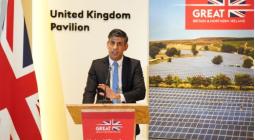Extra €406bn needed annually to hit EU’s 2030 climate target: report
Even though green investments have gained momentum in recent years, a gap of €406 billion remains to be filled annually in order to meet the EU’s 2030 climate goals, according to new research published on Wednesday (21 February).
The figure was released as part of the “European Climate Investment Deficit report” by the Institute for Climate Economics (I4CE), an independent think-tank chaired by Jean Pisani-Ferry, a former chief advisor to the French government.
The report is the first of its kind to comprehensively track public and private investments in economic sectors considered key to the EU’s decarbonisation goals – energy, buildings, and transport.
According to the research, at least €813 billion is needed annually across 22 economic sectors to meet the EU’s decarbonisation target – a 55% net reduction in greenhouse gas emissions by 2030 compared to 1990 levels.
But even though green investments have increased over the years, they are currently falling short of the 2030 goal, the researchers found.
“As real-economy investments reached €407 billion in 2022, this leaves a European climate investment deficit of €406 billion per year, or 2.6% GDP,” the report states, adding that investments “must still double for the EU to hit 2030 climate targets”.
The report is being presented in Brussels on Wednesday as EU institutions prepare for the next five-year mandate (2024-2029) following the June European elections.
European Commission President Ursula von der Leyen officially put forward her candidacy for a second term on Monday, and the achievement of the 2030 climate goals has already been flagged as one of the main challenges for the next EU term.
From Thursday to Saturday, EU finance ministers are meeting in Ghent to discuss the economic outlook, including the future policies of the European Investment Bank (EIB) and a working session with former European Central Bank chief Mario Draghi, who was tasked in September with preparing a report on the future of Europe’s competitiveness.
The outlook is rather bleak, with the eurozone’s first economy, Germany, set to enter recession this quarter and France scaling back its growth forecasts over the weekend, as the Commission cut its own outlook for the year.
According to I4CE, closing the green investment gap will require “a comprehensive approach” involving regulations, carbon pricing policies, and “some additional EU public funding”.
But this will require tackling “political questions” such as the constraints imposed by EU fiscal rules on national spending, the role of EU funds in supporting green policies, as well as the debate on potential new sources of EU funding, the report said.
EU countries agreed a reform of spending rules earlier this month. However, they made only limited extra room available for green investments, under pressure from “frugal” countries like Germany, who want to reinstate strict EU spending rules that were suspended during the COVID-19 pandemic and the energy crisis.
“The European Commission needs to better assess and address the EU Climate Investment Deficit, or risks seeing the Green Deal failing to deliver on its economic, social and environmental promises,” I4CE warns in its report.
New potential sources of funding are being envisaged such as a continuation of the €800 billion “Next Generation EU” plan launched in the wake of the coronavirus pandemic, which introduced joint EU debt for the first time.
However, all these solutions require political backing from the 27 EU leaders.
The European Commission itself acknowledges that huge investments will be necessary to meet the EU’s climate goals, saying a combined €1.5 trillion will be needed annually between 2030 and 2050 to meet the EU’s net-zero emissions target for energy and transport.
The Commission figures, outlined in its recommended climate target plan for 2040, also emphasise the importance of an “industrial decarbonisation deal” to meet the EU’s green goals, echoing calls President von der Leyen made in her last State of the Union address in September.
Cover photo: “The European Commission needs to better assess and address the EU Climate Investment Deficit, or risks seeing the Green Deal failing to deliver on its economic, social and environmental promises,” I4CE warns in its report. [Photo credit: European Union, 2023]




